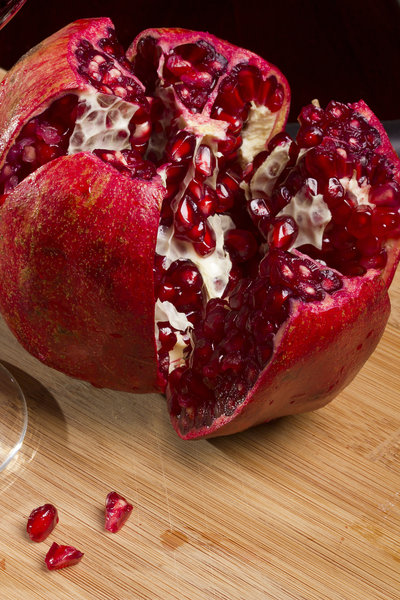Pomegranate

What is a pomegranate?
The pomegranate is a fruit that originally comes from the Mediterranean region and the Middle East. It is one of the oldest cultivated plants of mankind and has been used as a food and remedy for thousands of years. The pomegranate has a leathery skin, which can be green, yellow or red, depending on the variety. Inside are many small seeds surrounded by a juicy skin. These seeds are the edible part of the pomegranate and are also known as arils.
The pomegranate is rich in vitamins, minerals, antioxidants and fiber. It has a high content of polyphenols, which can have anti-inflammatory, antibacterial and cancer-preventing effects. It also contains punicic acid, an omega-5 fatty acid that can strengthen the immune system and lower cholesterol levels.
What are the benefits of pomegranate for dogs?
Pomegranate can also be healthy for dogs in moderation. It can strengthen the dog's immune system and help it to fight free radicals. Free radicals are harmful molecules that are produced by environmental factors or metabolic processes and can cause cell damage. Antioxidants such as polyphenols can neutralize these free radicals and thus reduce the risk of chronic diseases such as cancer or arthritis.
Pomegranate can also promote your dog's heart health by regulating blood pressure and blood sugar levels. It can also improve blood circulation and prevent the formation of blood clots. Pomegranate can also stimulate your dog's digestion and prevent constipation as it contains a lot of fiber.
What are the disadvantages of pomegranate for dogs?
Pomegranate is not suitable for all dogs and should only be fed in small quantities. It can have some side effects that you should be aware of:
- Pomegranate can cause gastrointestinal discomfort such as diarrhea, vomiting or bloating in some dogs. This is because pomegranate contains a lot of acid, to which some dogs react sensitively.
- Pomegranate can cause allergic reactions such as skin rashes, itching or breathing difficulties in some dogs. This is because pomegranate contains some proteins that some dogs cannot tolerate.
- Pomegranate can lead to interactions with medications such as blood thinners or antibiotics in some dogs. This is due to the fact that pomegranate can inhibit certain enzymes that are responsible for breaking down these drugs.
- Pomegranate can cause an overdose of potassium in some dogs, which can lead to cardiac arrhythmia or muscle weakness. This is due to the fact that pomegranate contains a lot of potassium and some dogs already have high potassium levels.
Pomegranate is a fruit with many health benefits for dogs. It is rich in vitamins, minerals, antioxidants and fiber, which can boost the immune system, fight free radicals and promote heart health. However, pomegranate should be fed in moderation as it can cause gastrointestinal discomfort, allergic reactions or drug interactions in some dogs.
If you notice any signs of hypersensitivity or poisoning in your dog, you should see your vet immediately. We are not a substitute for a vet, but we try to be as accurate as possible. Every dog reacts differently and we recommend you get a second opinion or consult your vet if in doubt.
Stay healthy and take good care of your four-legged friend!😊
Similar to Pomegranate
What is a mango? A mango is a stone fruit that grows on a tree. It has a yellow to orange color and a sweet taste. The skin of the mango is not edible and must be removed. There is a large pit inside...
Raspberries are berry fruits that belong to the rose family. They grow on bushes that can grow up to two meters high. The fruits consist of many small individual fruits, which together have a...
Blackberries are berry fruits that belong to the rose family. They grow on thorny bushes, which can often be found on forest edges, hedges or fences. The fruits are black or dark purple when ripe...
Strawberries are not real berries, but aggregate fruits. This means that the small yellow seeds on the red surface are the actual fruits, which are surrounded by a fleshy receptacle. Strawberries...



